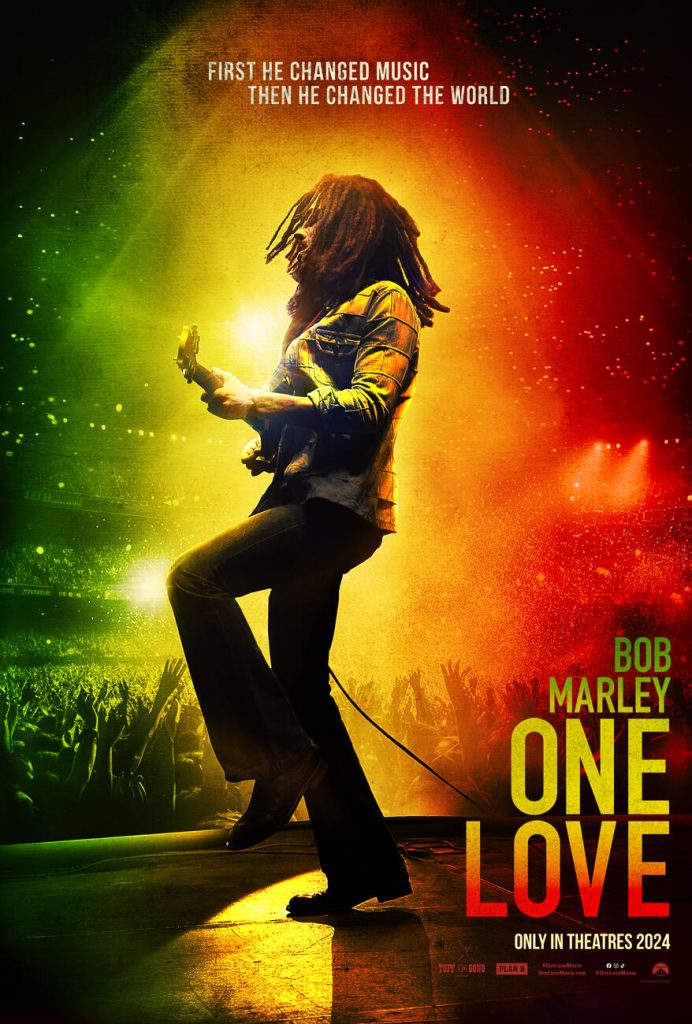It’s no secret that there’s been a substantial influx in musical biopics in Hollywood. In the past decade, audiences haven’t been able to go a year without another beloved artist getting their run on the silver screen. It’s a lucrative strategy — producers target icons with massive, built-in audiences that will generate income no matter the quality of the project. Last year, it was Leonard Bernstein in “Maestro.” The year before that, “Elvis.” This year, Bob Marley makes his feature-film debut in Reinaldo Marcus Green’s “Bob Marley: One Love.”
All that isn’t to say that every musical biopic is some cash-grabbing cog in the corporate machine. In fact, plenty of these movies are unique and encapsulating in their own way. Unfortunately, it is possible for these films to leave an unoriginal and ultimately uninspired taste in the mouths of their audience. After sitting in a packed theater for its one hour and 47 minute runtime, it became clear that “Bob Marley: One Love” falls victim to this shortcoming.
The most disappointing aspect of the film is, surprisingly, the story. It’s hard to mess up what is arguably one of the most influential careers in music history, yet this script frames the timeline of Marley’s story in a way that simply doesn’t do it justice. The film opens and closes with two massive blocks of text acting as exposition for this specific era of Marley’s career. The issue is, this “exposition” is foundational information that should have totally been included in the film’s actual runtime.
How can you make a movie about Marley and skip over his rise to popularity in Jamaica? His tour in Africa? The man brought together two diametrically-opposed political leaders on the same stage — and it was just a footnote in Marcus Green’s depiction. It’s not like there wasn’t time to develop these plot lines either, as the biopic was short for the genre, logging well under two hours. Overall, the exclusion of these key events felt lackluster. It made the pacing of the movie feel stunted, and negatively impacted the way the characters developed throughout the duration.
This mundanity permeates throughout some of the most key moments in the script. The movie doesn’t take time to build and establish the significance of some of the most important characters in Marley’s story. By the end of the movie, there were three or four rushed plot lines that the audience was somehow supposed to piece together in order to understand whatever conclusion was thrown at them in the epilogue text-wall.
As luck would have it, this flaw seems to be the most glaring problem the movie faces. It’s a structural issue and certainly diminishes the depiction of a legendary legacy, but it’s not a difficult movie to find yourself enjoying at times. Like most musical biopics, the music was fantastic and the acting was pretty alright. Kingsley Ben-Adir does a fine job holding it down as the titular role, but it was really his on-screen wife played by Lashana Lynch that took the spotlight. Ben-Adir’s movements, especially in his moments on-stage and in concert, felt dry and fatigued. There was a brief snippet of a Marley concert at the end of the film which hilariously looked almost nothing like the performances the audience had just seen.
The energy, passion and intensity of Marley as he writhed around the stage was just nowhere to be seen in “One Love.” On the other hand, his vocal performance was extremely impressive. His movements did feel detached from what the audience was hearing, and this resulted in some pretty goofy lip-sync moments, but nothing too bad. Overall, he was a strong and charismatic leading man. As mentioned previously, however, it is Lynch’s Rita Marley who is the emotional cornerstone of this project. The two have good chemistry and form a lovable pair — although the relationship goes rather unexplored for the majority of the movie.
And when it comes down to it, that’s the story of “Bob Marley: One Love.” The strongest, most interesting parts of Marley’s narrative go unexplored. It felt incomplete. There was no real goal being accomplished, just a collage of notable events in Marley’s life in a given era. It was uninspired and lacked what made so many musical biopics innovative and original. Entertaining for a brief period, and disappointing for the rest, “Bob Marley: One Love” is a paradigmatic depiction of what oversaturation in Hollywood can be. Next time you need your fix of Marley and the Wailers, just throw on “Exodus” and let the king of reggae show you himself what kind of legacy he sought to leave.
Overall: 2.25/5



